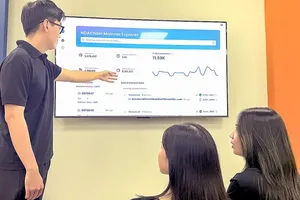According to the Bach Khoa Anti-Virus Center’s statistics, cyber attacks are typically attempts by cybercriminals to access, alter, or damage the target’s computer system or network, which can result in down-time for sites and apps, and theft of funds and data.
As a result, trillions of Vietnam dong was lost because cybercriminals’ infiltration into banks and risks of insecurity from social network. Many organizations and businesses have intentionally been hit by gangs of cybercriminals as per new approaches.
Also in 2020, the coronavirus pandemic occurred pushing many organization and enterprise employees to switch to working from home. During these unprecedented times, organizations and enterprises must use internet-connected systems but devices secure has not kept pace which created a favorable for bad guys to attack and steal information.
For years, there are several large-scale cyber attacks in the world. For instance, the world’s largest electronics manufacturer, Foxconn, has suffered a cyber attack and extortionists are reportedly demanding a $34 million ransom be paid for the recovery of its data or personal data consisting of user IDs, phone numbers and names of 267,140,436 Facebook users was left exposed on a database online.
Bkav has said many big e-commercial platforms in the Southeast Asian country with many users have been infiltrated and personal information of thousand users have been stolen.
The increasing threat of cyber attacks on financial service providers is driving a major focus on cybersecurity, particularly in banking. In 2020 alone, hundreds of billions of Vietnam dong have been appropriated relating to banking cyber security mostly hacking bank users’ one-time password (OTP) security.
Averagely, Bkav system monthly detects over 15,000 spywares installed in smartphones. Specifically, spyware VN84App that can penetrate a smartphone to monitor and steal sensitive information like OTP codes and private messages of owners is currently aiming at Vietnamese mobile users. After a successful installation, VN84App will silently collect confidential data like messages, phone numbers, IMEI information to send to the hacker’s server.
A supply chain attack is a cyber-attack that seeks to damage an organization by targeting less-secure elements in the supply chain. Cybercriminals typically tamper with the manufacturing process of a product by installing a rootkit or hardware-based spying components
In Vietnam, Bkav’s monitoring system has recorded the supply chain attack in December, 2020 into important organizations.
Occurrence of W32.Fileless in 2020 is same as Bkav experts’ prediction. APT malware has also continued to cause problems in the country, with at least 800,000 computers infected with W32.Fileless in 2020 doubling against 2019.
W32.Fileless hides in the system configuration parameters such as Registry, WMI, or Task Schedule unlike other normal malwares. This fileless malware leaves no signs of its presence, according to Bkav’s vice president of anti-malware Vu Ngoc Son. Therefore, Antivirus software producers were forced to change their products or else their products will be useless.
Fraudulent transactions on smartphones are predicted to continue. Plus, defrauds in facebook will increase because countries have been limiting traveling resulting in big cyber transactions; bad guys will take advantage of the situation to cheat people.
























